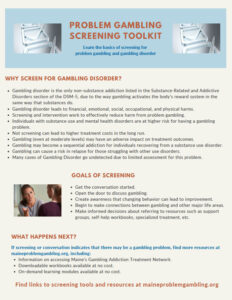Why Screen for Gambling Disorder?
- Gambling disorder is the only non-substance addiction listed in the Substance-Related and AddictiveDisorders section of the DSM-5, due to the way gambling activates the body’s reward system in the same way that substances do.
- Gambling disorder leads to financial, emotional, social, occupational, and physical harms.
- Screening and intervention work to effectively reduce harm from problem gambling.
- Individuals with substance use and mental health disorders are at higher risk for having a gambling problem.
- Not screening can lead to higher treatment costs in the long run.
- Gambling (even at moderate levels) may have an adverse impact on treatment outcomes.
- Gambling may become a sequential addiction for individuals recovering from a substance use disorder.
- Gambling can cause a risk in relapse for those struggling with other use disorders.
- Many cases of Gambling Disorder go undetected due to limited assessment for this problem
Goals of Screening
- Get the conversation started.
- Open the door to discuss gambling.
- Create awareness that changing behavior can lead to improvement.
- Begin to make connections between gambling and other major life areas.
- Make informed decisions about referring to resources such as support groups, self-help workbooks, specialized treatment, etc.
Brief Biosocial Gambling Screen (BBGS)
The BBGS is a fast, evidence-based, 3-question gambling screening tool.
Find the digital BBGS here.
- During the past 12 months, have you become restless, irritable, or anxious when trying to stop/cut down on gambling?
- During the past 12 months, have you tried to keep your family or friends from knowing how much you gambled?
- During the past 12 months, did you have such financial trouble that you had to get help with living expenses form family or welfare?
Note: Any affirmative answer is reason for further examination/assessment.
Problem Gambling Severity Index (PGSI)
Thinking about the last 12 months, score the following questions using the scale below:
Never=0, Sometimes=1, Most of the time=2, Almost always=3
The PGSI can be downloaded and printed here.
- Have you bet more than you could really afford to lose?
- Have you needed to gamble with larger amounts of money to get the same feeling of excitement?
- When you gambled, did you go back another day to try to win back the money you lost?
- Have you borrowed money or sold anything to get money to gamble?
- Have you felt that you might have a problem with gambling?
- Has gambling caused you any health problems, including stress or anxiety?
- Have people criticized your betting or told you that you had a gambling problem, regardless of whether or not you thought it was true?
- Has your gambling caused any financial problems for you or your household?
- Have you felt guilty about the way you gamble or what happens when you gamble?
Total your score. The higher your score, the greater the risk that your gambling is a problem.
- Score of 0 = Non-problem gambling.
- Score of 1 or 2 = Low level of problems with few or no identified negative consequences.
- Score of 3 to 7 = Moderate level of problems leading to some negative consequences.
- Score of 8 or more = Problem gambling with negative consequences and a possible loss of control.
DSM-5 Criteria
Persistent and recurrent problematic gambling behavior leading to clinically significant impairment or distress, as indicated by the individual exhibiting four (or more) of the following in a 12-month period:
Download the printable DSM-5 Criteria here.
- Needs to gamble with increasing amounts of money in order to achieve the desired excitement.
- Is restless or irritable when attempting to cut down or stop gambling.
- Has made repeated unsuccessful efforts to control, cut back, or stop gambling.
- Is often preoccupied with gambling (e.g., having persistent thoughts of reliving past gambling experiences, handicapping or planning the next venture, thinking of ways to get money with which to gamble).
- Often gambles when feeling distressed (e.g., helpless, guilty, anxious, depressed).
- After losing money gambling, often returns another day to get even (“chasing” one’s losses).
- Lies to conceal the extent of involvement with gambling.
- Has jeopardized or lost a significant relationship, job, or educational or career opportunity because of gambling.
- Relies on others to provide money to relieve desperate financial situations caused by gambling.
Why Screening Often Doesn't Work (at first)
Often, gambling screening tools will not uncover a gambling problem because:
- The individual may not realize they are engaging in gambling.
- The individual doesn’t realize that gambling is a potential problem.
- Stigma – The individual believes it is a character flaw instead of a disorder and fears that the provider and others will judge them.
- The individual believes gambling is a solution to their problems(emotional and/or financial).
- The individual realizes that gambling is causing a problem, but they aren’t willing to consider giving it up.
- A person who is addressing other mental health or substance use disorder(s) may feel overwhelmed by dealing with just one problem and don’t feel like they can deal with their gambling at this time.
